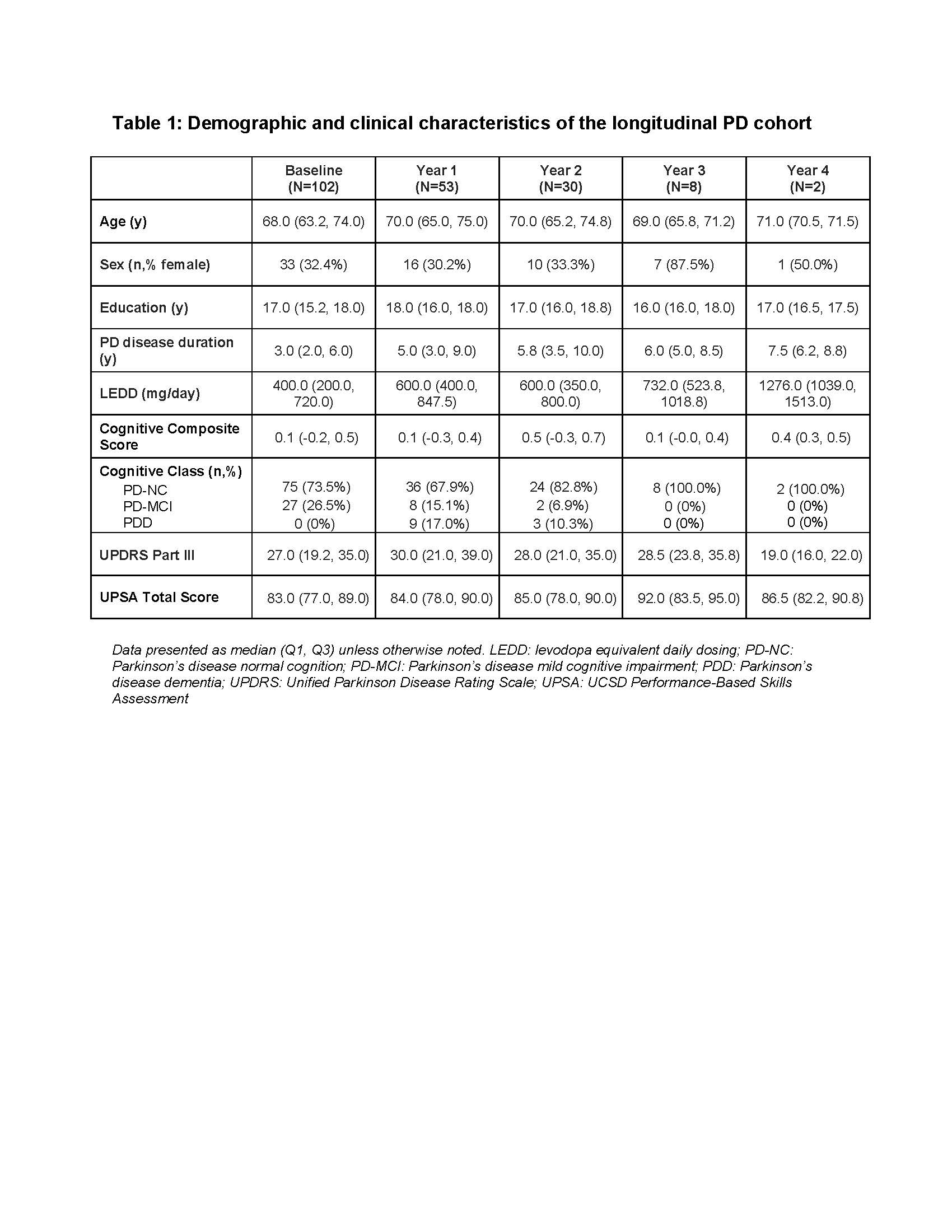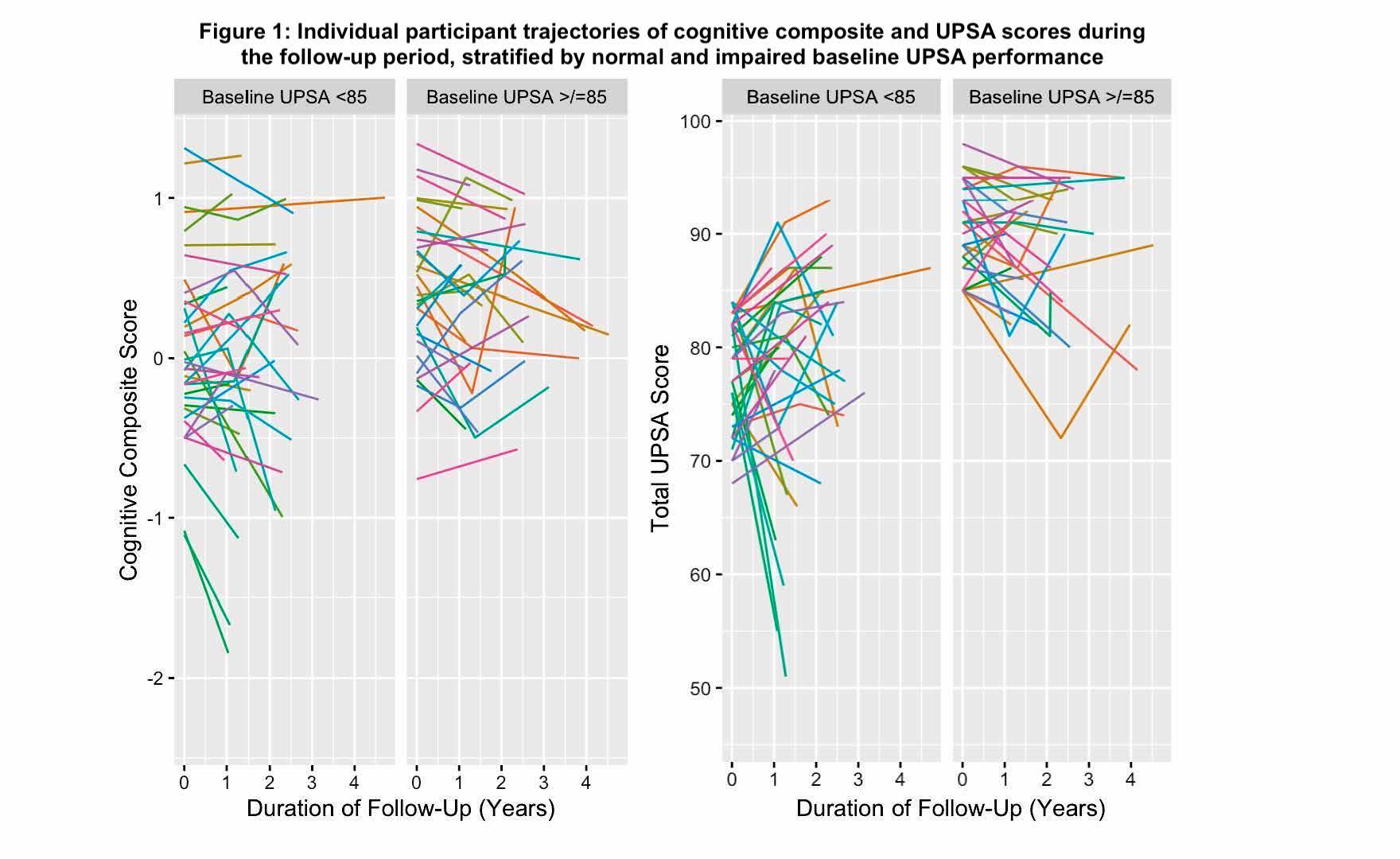Category: Parkinson's Disease: Cognitive functions
Objective: Detect the earliest changes in cognitively demanding activities of daily living in Parkinson’s disease (PD) and determine their relationship with changes in global cognition over time.
Background: Our team validated the UCSD Performance-Based Skills Assessment (UPSA) in PD, demonstrating its association with cognition rather than motor symptoms and its ability to discriminate cognitively impaired groups [1]. Despite normal neuropsychological testing results, some participants with PD perform poorly on the UPSA at baseline, raising the possibility that the UPSA may detect early, subtle cognitive changes missed by traditional cognitive assessment. We have followed our validation cohort without dementia at baseline (total n=102) to explore patterns of cognitive functional changes and assess how the UPSA may supplement prediction of cognitive decline.
Method: 73 participants with PD with at least two study visits between 2015 and 2021 were included, using data from neuropsychological batteries (10 tests, 2 in each of 5 domains, with Z-scores averaged into cognitive composite scores, used as our outcome measure for global cognition) and UPSA scores. Linear mixed models, including a random intercept, were used to evaluate the relationship between cognitive composite score and baseline UPSA, univariately and adjusting for clinically relevant variables.
Results: Demographic and clinical characteristics are presented in Table 1; due to skew of variables, median (Q1, Q3) is presented. Baseline UPSA score and age were significantly related to cognitive composite score (p<.01) in univariate models, while duration of follow-up, education, and sex were not (p=.14-.77). In the final model, baseline UPSA score remained significantly related to cognitive composite score (β=.04, 95% CI .02, .05), as did age (β=-.02, 95% CI -.04, -.01). Individual trajectories for cognitive composite and UPSA scores over time are presented in Figure 1, stratified by normal and impaired baseline UPSA scores (cut-off 85/100).
Conclusion: Baseline UPSA scores were significantly related to cognitive composite scores over time in our cohort with PD. There is heterogeneity in cognitive and functional trajectories of our participants with PD, which will be further evaluated. The addition of objective cognitive functional assessment in PD may enrich cognitive profiling and dementia risk prediction.
References: 1. Holden SK, Medina LD, Hoyt B, et al. Validation of a performance-based assessment of cognitive functional ability in Parkinson’s disease. Movement Disorders 2018;33(11):1760-1768.
To cite this abstract in AMA style:
S. Holden, A. Fought, K. Olson, N. Lopez-Esquibel, T. Carlisle, L. Medina. Initial longitudinal analyses of objectively assessed cognitive functional abilities in a cohort with Parkinson’s disease [abstract]. Mov Disord. 2021; 36 (suppl 1). https://www.mdsabstracts.org/abstract/initial-longitudinal-analyses-of-objectively-assessed-cognitive-functional-abilities-in-a-cohort-with-parkinsons-disease/. Accessed July 26, 2024.« Back to MDS Virtual Congress 2021
MDS Abstracts - https://www.mdsabstracts.org/abstract/initial-longitudinal-analyses-of-objectively-assessed-cognitive-functional-abilities-in-a-cohort-with-parkinsons-disease/


